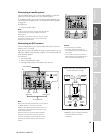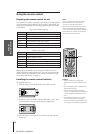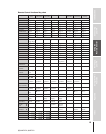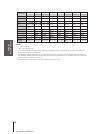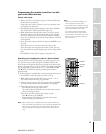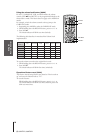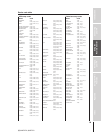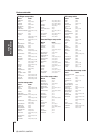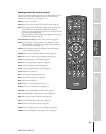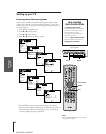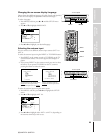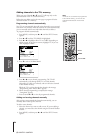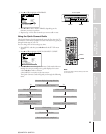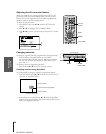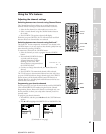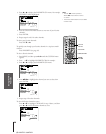
Introduction
Connecting
your TV
Using the
Remote Control
Setting up
your TV
Using the TV’s
Features
Appendix
Index
21
(E) 32HFX72, 36HFX72
Learning about the remote control
The buttons used for operating the TV only are described here. For a
complete list of the remote control’s functions, see the “Remote
Control functional key chart” on pages 15 –16.
POWER turns the TV on and off
SLEEP allows access to the automatic TV shut-off function (page 46)
LIGHT The first press of the LIGHT button lights the keypad and turns
on the Illumination mode. With the Illumination mode on,
pressing any other key lights the keypad for 5 seconds (10 seconds
if you’re in programming mode).
Subsequent presses of the LIGHT button toggle between turning
the Illumination mode on and off.
Channel Numbers (0-9, 100) allow direct access to channels (page 26)
MODE cycles through the six device modes: TV, CABLE/SAT, VCR,
DVD, AUDIO1, and AUDIO2. The mode indicator light will
remain lit for 10 seconds (page 17).
PIC SIZE cycles through the three picture formats: Normal, Letterbox
and Compression (page 30)
FAVORITE allows access to the Multi-Window function (page 34)
MENU allows access to on-screen programming menus (page 22)
ENTER sets programming menu information (page 22)
yz x • select or adjust programming menus (page 22)
FAV zy cycles through favorite channels (page 28)
CH yz cycles through programmed channels (page 26)
VOL yz adjusts the volume level
EXIT exits the programming menus (page 22)
INPUT selects the video input source (page 44)
MUTE mutes the sound (page 47)
RECALL displays on-screen information (page 51)
CH RTN returns to the memorized channel (page 27)
PIP CH yz selects the PIP/double-window channel (page 32)
PIP turns the PIP/double-window feature on and off (page 32)
MULTI allows access to multi-window function (page 34)
STILL freezes the PIP/double-window picture (page 33)
SWAP switches the main and sub-pictures (page 33)
LOCATE changes the display position of the small picture (page 33)
SOURCE selects the PIP/double-window picture source (page 32)
CT-90121



